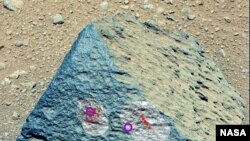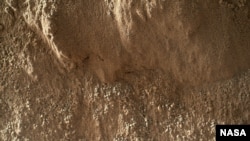The Mars rover Curiosity, now 63 days into its two-year exploration of the red planet, has analyzed a football-sized rock that NASA scientists say has some surprisingly Earth-like qualities.
Curiosity's engineers on Earth put the drilling and sampling tools on the rover's robotic arm to full use this week as they assessed the makeup of the pyramid-shaped rock. The sample is named Jake Matijevic, in honor of a senior engineer on the Curiosity team who passed away this summer. Co-investigator Edward Stolper of the California Institute of Technology says the football-size rock is similar to a kind of igneous, or volcanic rock found on Earth.
"The composition of Jake Matijevic is a very close match to highly crystalized or fractionated magmas that occur on particular places on earth," said Stolper.
Stolper says it is difficult to conclude from this one rock whether it formed the same way such rocks formed on Earth. But he says further studies could answer that question.
Scientists were pleased with the data they gathered from two new instruments on Curiosity - the Alpha Particle X-Ray Spectrometer and the Chemistry and Camera Instrument, called ChemCam, which shoots rock-busting laser pulses from the top of the rover’s mast.
NASA scientists say the information from the two instruments is just a preview of things to come. The rover also carries tools to gather and analyze soil samples. Actually, the first samples will be used to clean off a protective film of oil - possibly bearing traces of terrestrial dust - left on the instruments when they were assembled on Earth. Chris Roumeliotis, with NASA’s Jet Propulsion Laboratory, says it's rather like a Martian car-wash.
“The decontamination activity is extremely important because we don’t want our instruments spooked by any terrestrial contamination. And once we clean everything we will be up and running with full capability," said Roumeliotis.
After the decontamination, the rover will be driven about 90 meters toward another rock in the Gale Crater area that's been selected as the first target for Curiosity's drill.
Over the rover's two-year mission, researchers will be studying whether this region of Mars ever had - or might still have - conditions that could support life.
Curiosity's engineers on Earth put the drilling and sampling tools on the rover's robotic arm to full use this week as they assessed the makeup of the pyramid-shaped rock. The sample is named Jake Matijevic, in honor of a senior engineer on the Curiosity team who passed away this summer. Co-investigator Edward Stolper of the California Institute of Technology says the football-size rock is similar to a kind of igneous, or volcanic rock found on Earth.
"The composition of Jake Matijevic is a very close match to highly crystalized or fractionated magmas that occur on particular places on earth," said Stolper.
Stolper says it is difficult to conclude from this one rock whether it formed the same way such rocks formed on Earth. But he says further studies could answer that question.
Scientists were pleased with the data they gathered from two new instruments on Curiosity - the Alpha Particle X-Ray Spectrometer and the Chemistry and Camera Instrument, called ChemCam, which shoots rock-busting laser pulses from the top of the rover’s mast.
NASA scientists say the information from the two instruments is just a preview of things to come. The rover also carries tools to gather and analyze soil samples. Actually, the first samples will be used to clean off a protective film of oil - possibly bearing traces of terrestrial dust - left on the instruments when they were assembled on Earth. Chris Roumeliotis, with NASA’s Jet Propulsion Laboratory, says it's rather like a Martian car-wash.
“The decontamination activity is extremely important because we don’t want our instruments spooked by any terrestrial contamination. And once we clean everything we will be up and running with full capability," said Roumeliotis.
After the decontamination, the rover will be driven about 90 meters toward another rock in the Gale Crater area that's been selected as the first target for Curiosity's drill.
Over the rover's two-year mission, researchers will be studying whether this region of Mars ever had - or might still have - conditions that could support life.





